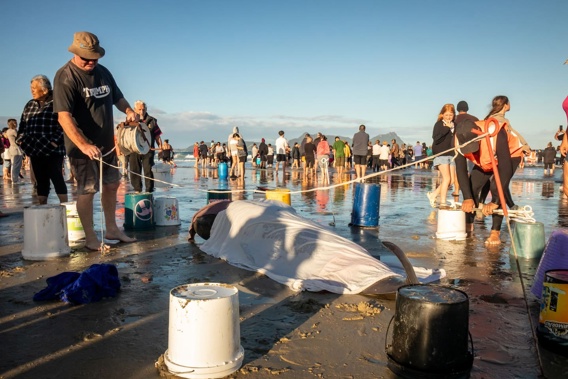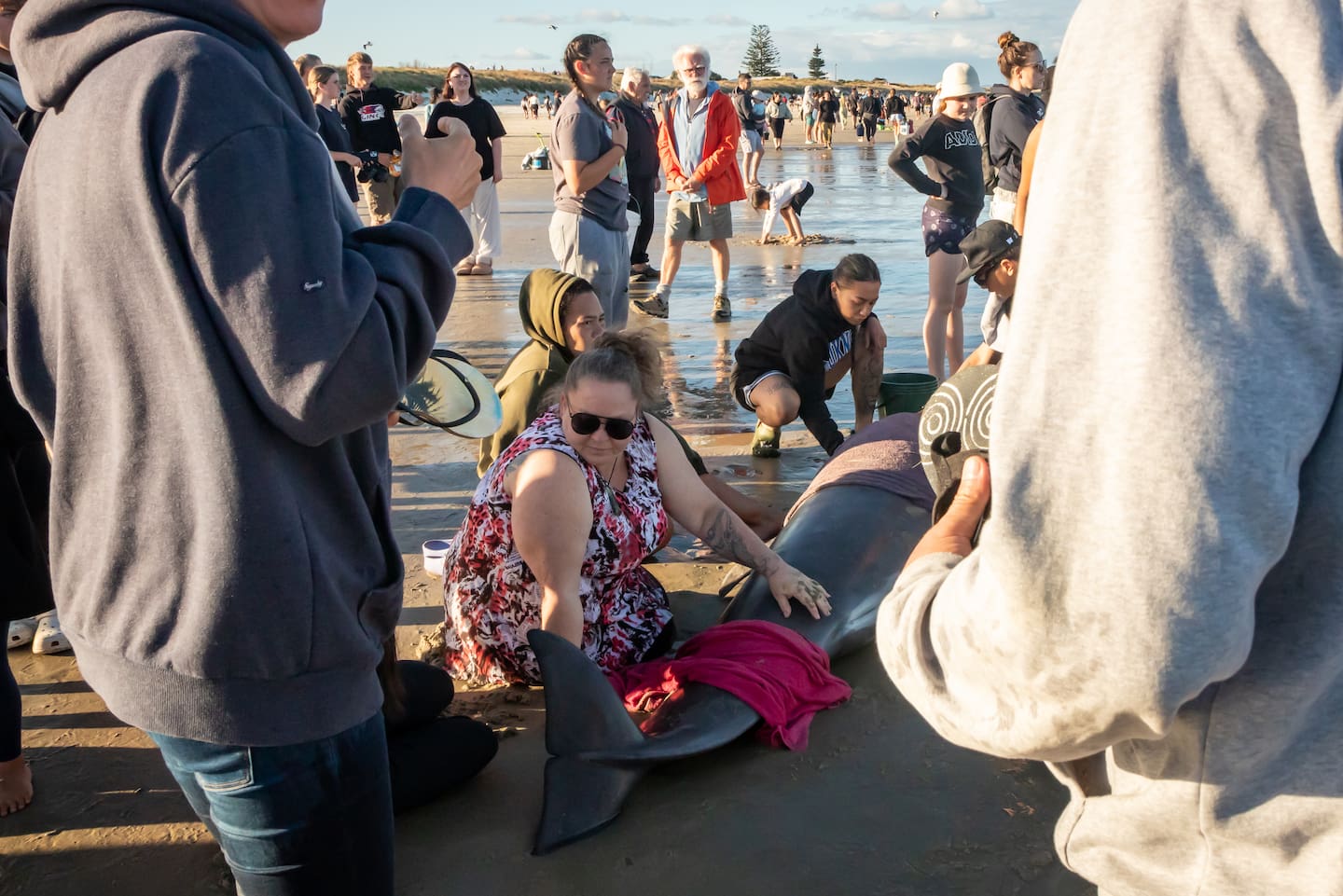
A pod of pilot whales rescued after stranding on Ruakākā Beach yesterday, have stayed safely out at sea overnight but officials are keeping watch in case the group beaches again.
The pod of up to 40 whales came ashore about 5.30pm.
Most were successfully refloated and headed back out to sea, apart from four - a calf and three young adults - that died on the shore or in the shallows.
As daylight began to fade, hundreds of people who had helped with the refloat, left the beach in a state of high anxiety amid fears the rescued pod was swimming towards the river mouth further north of the beach and could possibly strand again.
However, the pod remained under the close eye of local iwi members, the Department of Conservation, and Project Jonah staff who reported this morning that there had been no further stranding.
Yesterday Dave Milner of Patuharakeke hapū said he was moved by the massive turnout of people at the beach to help the whales.
“There’s been thousands [of people] here in a short amount of time so just a big mihi to the community for coming all in for the one purpose,” he said.
Carloads of people had come in droves from wider Whangārei and further ahead as news of the stranding spread across social media, Northland Fishing Facebook group first putting out its call to action.
People from all walks of life, including families with young children, rushed with towels, blankets, buckets, and shovels to the beach hoping to help keep the animals wet as the tide retreated.
One person described the size of the crowd as “phenomenal”.
“There were reports police had asked people not to come and to leave it to DoC [the Department of Conservation], but the people sure turned out regardless,” that person said.
Experts told the crowds not to pull, roll or drag the whales and to stay clear of their tails.
An earlier video from the scene showed hundreds of people in bare feet and shorts, wetsuits, and togs filling large buckets of water to pour over the beached whales.
Once the pod was refloated, helpers were asked to form a “human wall” in the water and make banging noises by clapping their hands, slapping their shoes together, or drumming on buckets to deter the rescued whales from heading back to the beach.
Soon however, the crowd was forced to moved several hundred metres up the beach to the mouth of the Ruakaka River, where there were fears the whales could strand again. However, Milner said that fortunately had not happened.
Among the volunteers on the beach, was Green Party List MP and Patuharakeke member Hūhana Lyndon, who said she was there to tautoko (support) the hapu in its efforts to look after “not only the people on the land but the taonga whales.
Milner said there it was hard to tell exactly how many whales had beached but it was somewhere between 20 and 40.
The ones that died ranged in age from a calf to a young adult. They would be acknowledged with a karakia (prayer) then transferred to an area for customary practices.
Strandings at Ruakaka seemed to be happening annually, Milner said.

Volunteers sit with a Pilot whale calf that died before it could be refloated with the rest of its pod at Ruakākā Beach yesterday. Photo / Sarah Curtis
Local contractors had been called to help move the whales, which would be subject to scientific examination and testing then processed by iwi as per traditional protocol today.
The whales would ultimately be buried either at the beach near where they stranded or at a specially allocated area elsewhere, Milner said.
Other members of Patuharakeke would remain with DoC staff at the beach today to monitor the area for any further strandings.
DoC said, “We encourage the public to stay vigilant along the Bream Bay coastline and report any whale sightings or potential strandings immediately by calling 0800 DOC HOT (0800 362 468).
Operations manager Joel Lauterbach said, “The effort on the beach last night was incredible. It’s amazing to witness the genuine care and compassion people have shown toward these magnificent animals. This response demonstrates the deep connection we all share with our marine environment.
“Patuharakeke have led the on-ground response, and we are deeply grateful for their leadership, as well as the support from Project Jonah and the hundreds of members of the public who have assisted so far. Today, DoC will continue supporting Patuharakeke with the four deceased whales as required.”
Sarah Curtis is a news reporter for the Northern Advocate, focusing on a wide range of issues. She has nearly 20 years’ experience in journalism, much of which she spent court reporting. She is passionate about covering stories that make a difference
Take your Radio, Podcasts and Music with you









